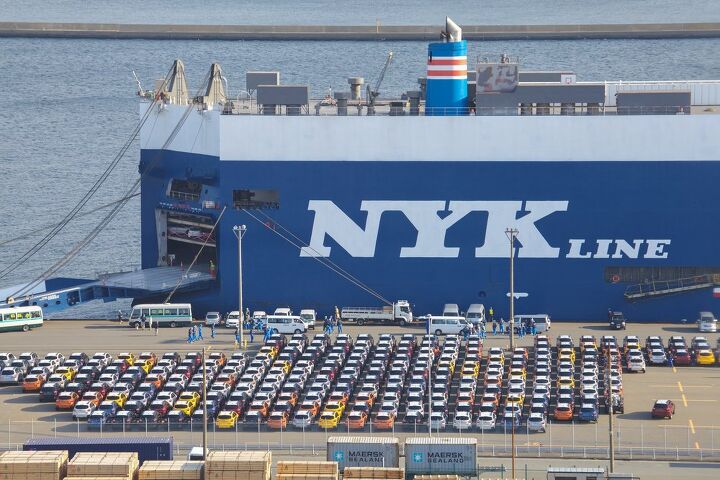#TradeTalks
United States Won't Raise Tariffs on Japanese Vehicles, Report Suggests
With Japan and the United States spending the better part of the summer discussing trade relations, there were minor fears that the island nation would become subject to new tariffs. Fortunately, most of the reporting on the matter showed negotiations to be productive, with President Donald Trump and Prime Minister Shinzo Abe perpetually optimistic about the two countries’ relationship.
Last month at a Group of Seven Summit, the pair even claimed to be on the verge of signing a new agreement. According to Reuters, that will come without new fees on Japanese-made automobiles.
How Seriously Should We Take Trump's Mexican Auto Tariff Threat?
On Thursday, President Donald Trump threatened to impose tariffs on cars entering the United States from Mexico if the nation doesn’t assist Washington in dealing with the migrant situation at its southern border. It’s a rather bold ultimatum, coming hot on the heels of claims that the White House was seriously considering closing the border entirely if Mexico could not curtail the flow of illegal immigrants and drugs heading north.
It’s an interesting situation, especially considering both outcomes would upend the automotive industry. But Trump argues that the growing reliance on Mexican manufacturing and proliferation of illegal immigrants has already hurt the United States badly. A contentious stance, for sure, but these are issues in need of thorough discussion. Gallup polls repeatedly peg immigration as one of the issues voters care most about — along with healthcare and the economy.
However, we only care about those things tangentially. It’s all about the cars for us.
Trump Puts Hold on New Auto Tariffs; Trade Negotiations Commence With Europe
President Donald Trump agreed on Wednesday to refrain from imposing car tariffs while the United States launches negotiations to cut other trade barriers with the European Union. After a meeting at the White House, Trump and European Commission President Jean-Claude Juncker agreed to begin talks that would also seek to resolve U.S. tariffs on steel and aluminum, as well as retaliatory duties from Europe.
It’s the first lull we’ve seen in the trade war in a while. Meanwhile, Chinese trade relations remain as bitter as ever.
Bet You Forgot Today Was the NAFTA Deadline
If you forgot today was the deadline for finalizing North American Free Trade negotiations, don’t worry, so did practically everyone else. In fact, the whole affair is starting to feel like that old car that’s been sitting in your friend’s yard for far too long. He keeps telling you he’s going to fix it up and make it better than new. “This is the summer,” he says. But you know he’s just going to keep mowing around it while it continues to rust and collect mice, so you’ve tried to push it out of your mind.
Like the restoration, the entire concept of a deadline for the trade deal is rather arbitrary at this point. NAFTA’s initial target date for an agreement between the three countries was March 31st, roughly one year after negotiations began. The May 17th deadline was claimed by U.S. Speaker of the House Paul Ryan, who said Congress had to be notified under the Trade Promotion Authority statute.
“We need to receive the notice of intent to sign soon in order to pass it this year,” explained Ryan’s office. “This is not a statutory deadline, but a timeline and calendar deadline.”
Basically, Congress wants to influence the president and NAFTA negotiators to conclude talks swiftly and reach an agreement before midterm elections. But Mexican officials warned everyone not to get their hopes up. “The possibility of having the entire negotiation done by Thursday isn’t easy, we don’t think it will happen by Thursday,” said Mexican Economy Minister Ildefonso Guajardo earlier this week.
Team Trump Eases Demands on NAFTA's Regional Auto Content
The United States is softening the contentious automotive content requirement mandates pushed by the Trump administration as part of NAFTA renegotiation talks. While the demand is only one of many asks coming from the U.S., both Canada and Mexico said forcing 85 percent of a vehicle’s overall content to be sourced from the three countries (in order to side-step tariffs) was a nonstarter. Over the past year, the issue became a major sticking point in the trade talks — hindering progress and possibly dooming them to failure.
While Trump’s intent was to bolster domestic employment by incentivizing North American parts suppliers, automakers expressed concerns and noted it was often difficult to reach the current threshold of 62.5 percent.
The United States has now proposed applying the new content requirement only to major components (like a vehicle’s powertrain) while leaving fasteners (nuts, bolts, etc.) alone. As an automobile is made up of tens of thousands of individual parts, deciding what should and should not be counted will make a big difference. Still, some manufacturers are likely to have difficulty meeting the proposed content requirement on critical engine components.
And Now, Japanese Trade Talks Sans The Silly Propaganda
Now that the U.S. and Japan have agreed on a watered-down version of the Trans-Pacific Partnership trade negotiations (America will keep its beloved chicken tax for at least another decade, Japan will protect its rice farmers from the evils of cheap American rice,) negotiations between the EU and Japan about a trade pact are getting underway, with considerably less drama.





















Recent Comments